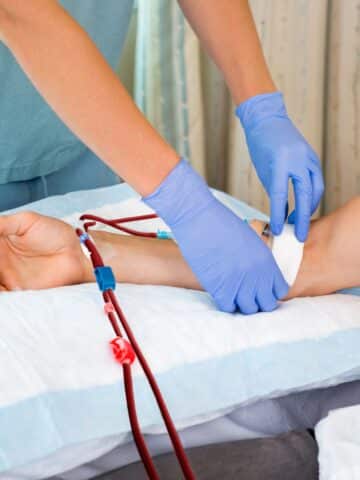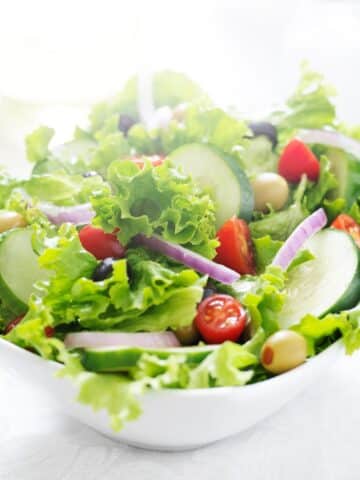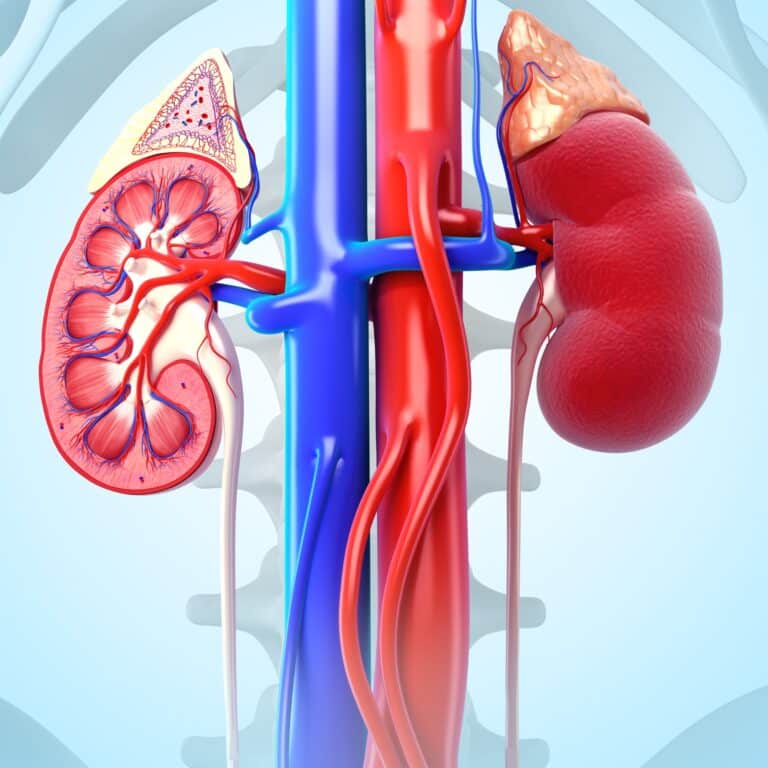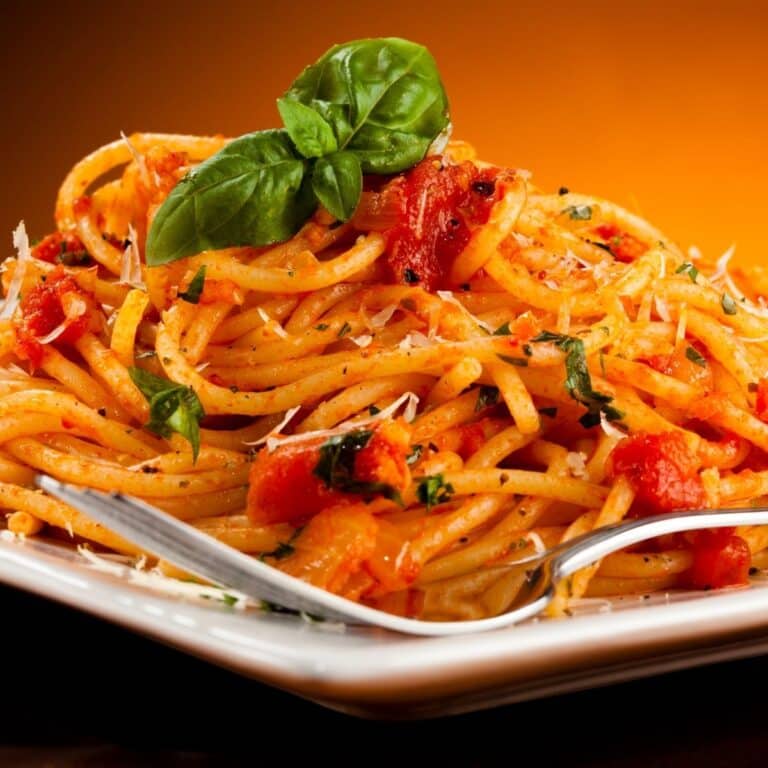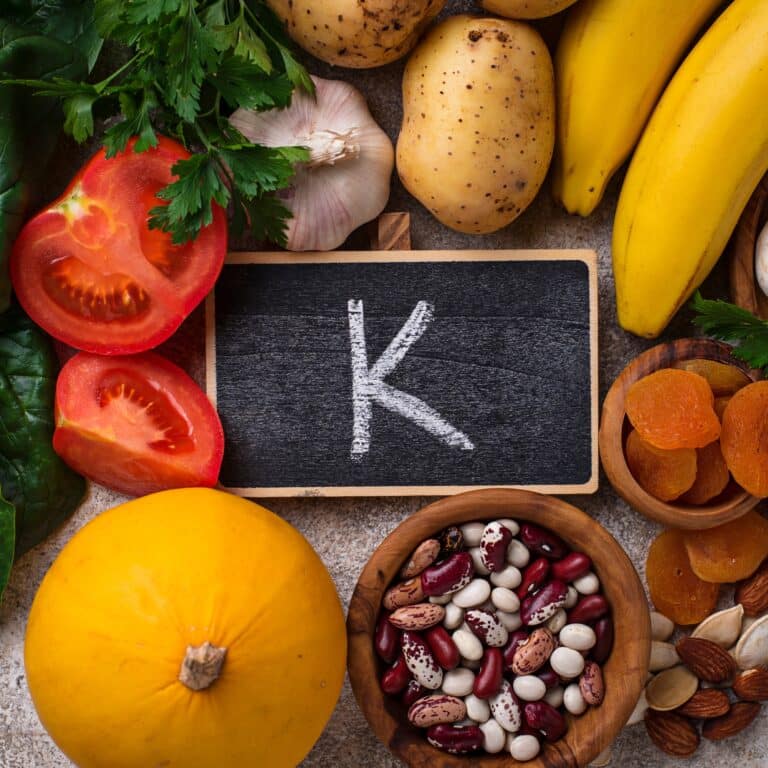Renal Diet Restrictions By Stage Of CKD
Chronic kidney disease (CKD) is a serious and progressive medical condition that can lead to kidney failure. As the stages of CKD progress, it becomes more important to follow specific dietary restrictions. You have the power to manage your CKD through diet; understanding what renal diet restrictions should be in place for each stage of disease is crucial.
In this article, you'll learn about the different stages of CKD and how they impact dietary guidelines. We'll cover the preventative measures as well as the recommended dietary adjustments for CKD. We'll also discuss protein intake's role in progression as well as managing sodium, potassium and phosphorus levels with a renal diet.

Finally, we'll look at adjusting diets for coexisting conditions for CKD patients. Together we can help improve quality of life through informed nutrition choices!
Jump to:
- Key Takeaways
- Overview: Stages of Chronic Kidney Disease and Dietary Impact
- Stage 1 CKD: Preventative Dietary Measures
- Stage 2 CKD: Mild Loss of Kidney Function and Dietary Adjustments
- Stage 3 CKD: Dietary Guidelines for Moderate Kidney Damage
- Stage 4 CKD: Severe Damage and Necessary Dietary Changes
- Stage 5 CKD: Kidney Failure and End-Stage Dietary Restrictions
- Nutritional Concerns at Different Stages of CKD
- Role of Dietary Protein in CKD Progression
- Managing Sodium, Potassium, and Phosphorus in a Renal Diet
- Fluid Restrictions in CKD: Why and How Much?"
- Dietary Adjustments for Co-existing Conditions in CKD Patients
- FAQs Renal Diet Restrictions By Stage Of CKD
- Renal Diet Restrictions Can Help You Manage Chronic Kidney Disease
Key Takeaways
- Dietary restrictions for CKD vary based on the stage of the disease.
- Early stage CKD requires reducing sodium intake and saturated fat, and monitoring mineral intake.
- Middle stage CKD involves optimizing fluid intake, and more strict control of mineral intake.
- Late stage CKD requires restriction of fluid intake, and considering phosphate binders and oral supplements.
For More Recipes and Ideas --->> Get Your Free Meals and Recipes That Are Perfect for Pre-Dialysis Diets, Pre-Dialysis with Diabetes, or Dialysis Diets.
Overview: Stages of Chronic Kidney Disease and Dietary Impact
Chronic kidney disease (CKD) can be a difficult condition to manage, and its stage directly impacts an individual's dietary restrictions. Depending on your stage of kidney disease, you may need to make multiple dietary adjustments, including limiting your uptake of protein, managing your electrolyte balance and fat intake, as well as other changes.
During the early stages of CKD, patients may need to reduce their dietary intake of sodium and saturated fat and incorporate more fresh fruits and vegetables in their diet.
In the more advanced stages such as Stage 4 or 5 CKD, it is recommended for individuals to further restrict their intake of protein and to avoid certain foods altogether, such as red meat, due to containing high levels of saturated fat and salt. In the late stages, restricting fluids is often recommended to avoid fluid retention.
In addition to diet modifications, individuals with renal diseases may also need medications, and a kidney transplant or dialysis treatments, depending on their stage of CKD. It is important for these individuals to work closely with a healthcare team who can provide guidance and support throughout treatment decisions.
Ultimately, managing dietary restrictions can help delay the onset of more severe symptoms associated with CKD while also helping ensure that individuals are getting adequate nutrition for overall health maintenance. Adopting healthy lifestyle habits, including monitoring diet sources and fluid intake, may go a long way towards improving an individual's quality of life despite living with CKD.
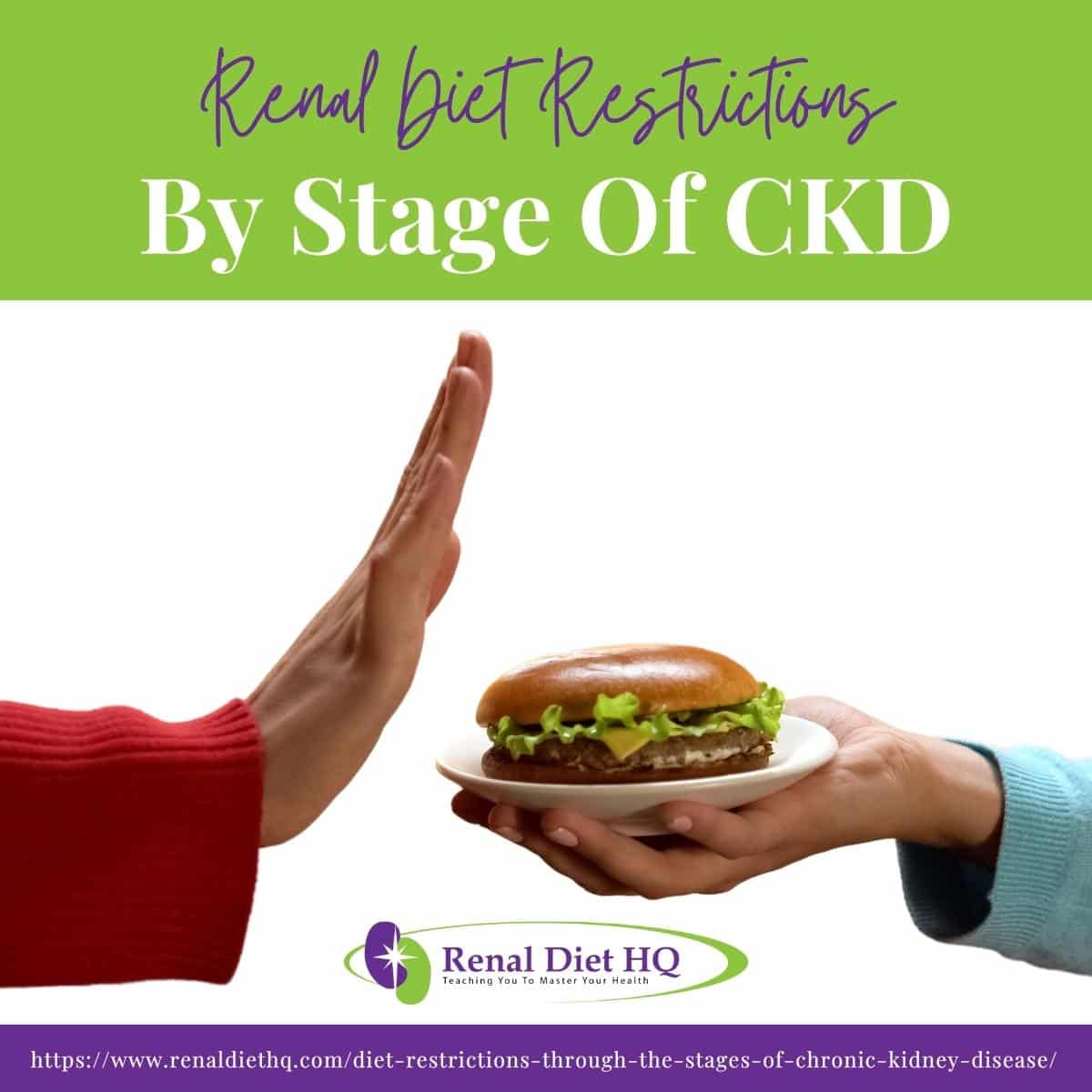
Stage 1 CKD: Preventative Dietary Measures
Except for people who are diagnosed during routine checkups, most people are not even aware that they have CKD during the first stage.
Most often, kidney disease is diagnosed in the second or third stage. If you are lucky enough to be diagnosed in the first stage, you can take simple steps to maintain your health and well-being before any other issues arise by following the recommended dietary measures for Stage 1 CKD.
Your dietitian will likely recommend dietary salt restriction but not too many other dietary restrictions. Too much salt can cause high blood pressure and fluid buildup around your heart and your lungs. Practicing portion control and reading food labels will help you avoid any excess sodium content.
If you are following a special diet for other conditions like diabetes and heart disease, you will need to continue following it. Maintaining a healthy blood sugar level is especially important for diabetic kidney patients, as high blood sugar causes further kidney damage.
By following these preventative dietary measures you will be able to maintain healthy kidneys throughout stage 1 CKD and prevent further decline of kidney function.
Stage 2 CKD: Mild Loss of Kidney Function and Dietary Adjustments
If you're suffering from mild loss of kidney function, adjusting your diet can help get things back on track. Stage 2 CKD is characterized by a moderate decrease in renal function and requires an individual to make dietary adjustments that focus on controlling health risks such as hypertension and other cardiovascular diseases.
At stage 2, people are more likely to have been diagnosed through routine screening, although symptoms are not likely to be obvious yet. At this point, your healthcare provider is likely to put you on a more strict low-sodium diet or even a renal, kidney-healthy diet.
Following a kidney-healthy diet means controlling your intake of these important minerals: sodium, potassium and phosphorus. Kidney disease patients may have trouble with balancing their potassium level, which may be too low or too high, which can cause heart problems.
Keeping away from excess phosphorus in your diet is also recommended since high dietary phosphorus can cause many health problems, such as increasing your risk of heart attacks and strokes and bone disease, as too much phosphorus lowers the amount of calcium in your bones, which leaves your bones weak.
Increasing fiber in your diet helps with digestion and keeps you feeling fuller longer while controlling hypertension. Whole grains, fruits, vegetables, and nuts are all great sources of fiber that can help meet these goals.
Lastly, drinking the recommended amount of water in the early stages of CKD will keep your kidneys functioning properly.
Eating the right foods is important for managing kidney disease symptoms, so it's important to choose food choices that are low in sodium, phosphorus, potassium, fat and calories. Additionally, monitoring kidney function should be done regularly through renal testing like urine protein creatinine ratio (UPCR) and glomerular filtration rate (GFR).
| Foods To Avoid | Health Risks. |
| High-sodium foods | Excess amounts of sodium lead to hypertension and fluid buildup |
| High-potassium foods | Excess potassium can cause many symptoms, including irregular heartbeat, muscle weakness, tingling, and numbness |
| High-phosphorus foods | High phosphorus intake can cause bone weakness, heart attacks, and strokes |
Although there are no complete cure for CKD, making healthy lifestyle changes may delay the need for dialysis or renal transplants. If you have Stage 2 CKD, speak with your diet about what types of dietary restrictions are best suited for you and if any supplements would be beneficial. You should also discuss any potential side effects of certain foods or supplements that could interfere with the effectiveness of your medications.
Understanding the importance of a balanced food plan along with adequate fluid balance will help keep your condition under control while improving your overall health and well-being.
Stage 3 CKD: Dietary Guidelines for Moderate Kidney Damage
In Stage 3 CKD, when kidney damage is moderate, you are more likely to have symptoms such as urinary retention and fatigue. So it might help you to know that the strict restrictions your healthcare provider is likely to put on your diet are likely to help relieve many of those symptoms. Along with sodium restrictions, your healthcare provider may recommend potassium and/or phosphorus restrictions.
People with stage 3 CKD must adjust their lifestyle and diet accordingly to keep a healthy balance. To achieve this, it's important to:
- Choose foods that support kidney health
- Restrict sodium, potassium, phosphorus consumption
- Track food and fluid intake
- Control blood sugar level
- Consider vitamin supplementation
Educate yourself on dietary modifications that can help reduce the strain on the kidneys while still providing adequate nutrition. Speak with registered dietitians who specialize in kidney diets for assistance in meal planning and recipes.
Stage 4 CKD: Severe Damage and Necessary Dietary Changes
If you or someone you know has been diagnosed with Stage 4 CKD, it's important to make dietary changes in order to slow the progression of kidney damage.
During stage 4, your healthcare providers might ask you to start cutting down on your protein intake. This is because excess protein buildup in your body can irreversibly damage your kidneys.
Phosphorus becomes a common restriction at stage 4, and potassium restrictions are also more likely. Fluid restrictions can sometimes become necessary at this point as well. Eating out should be avoided as much as possible, as restaurant foods often contain high amounts of sodium, sugar, fat, and calories.
You should stick to a diet that is low in salt, sugar, phosphorus, and potassium. It's important to maintain a healthy weight and avoid eating processed foods. Fluid intake needs to be closely monitored by your doctor or dietitian — drinking too much can lead to water retention and swelling. If the disease progresses, a kidney transplant or dialysis may be necessary.
Having a plan in place for your diet is key to managing Stage 4 CKD successfully. This will include making sure you're getting enough nutrients while avoiding unhealthy foods that could worsen your condition. Consider speaking with a registered dietician who can create an individualized meal plan tailored specifically for you.
Additionally, it's essential that you manage stress levels through relaxation techniques such as yoga or meditation — these activities can help keep you feeling positive during this difficult time.
With proper diet planning and lifestyle habits like stress management, you can still achieve optimal health despite having Stage 4 CKD (stage 4 kidney disease diet). Ultimately, following medical advice from specialists will give you the best chance at leading an active life with minimal disruption caused by the disease itself.
Stage 5 CKD: Kidney Failure and End-Stage Dietary Restrictions
Stage 5 CKD is also often referred to as “end-stage kidney disease (ESKD)”. At this point, most patients will need either dialysis or a transplant to replace kidney function. As you reach kidney failure, your kidneys can do less and less, so you need to help them by maintaining a lot of dietary restrictions.
All of the restrictions up until this point become even more strict and important, and often fluid restrictions need to be maintained as well. At the same time, it is important to eat enough calories to keep up your current weight and muscle mass.
Dietary restrictions can be tough to deal with, but they are a very important part of your treatment for CKD. Your diet is so important, in fact, that strictly adhering to dietary restrictions and maintaining a healthy diet and lifestyle can help you to slow the progression of kidney disease, and could even prevent you from ever reaching ESKD.
It's also important to get adequate amounts of nutrients such as calcium, magnesium, iron, zinc, and vitamins A & D while avoiding phosphorus-rich foods like processed foods, dairy products, and chocolate. Talk to your renal dietitian about your dietary restrictions and how you can better maintain a healthy diet and ensure adequate intake of nutrients with CKD.
For those in ESKD, food tracking can help ensure that they're not consuming too much protein or potassium. Reducing dietary salt intake is essential for managing high blood pressure (high blood pressure and kidney disease), and this can be done by avoiding processed foods and cutting back on added salt when cooking meals from scratch.
Making lifestyle changes is also very important when managing ESKD since physical activity can help reduce fatigue and stress levels while improving overall health outcomes. Regular exercise combined with healthy eating habits can provide improved quality of life even if kidney failure has already occurred, so it's never too late to start making positive changes!
Nutritional Concerns at Different Stages of CKD
Managing kidney disease at different stages can be tricky, especially when it comes to nutrition. During the early stages of CKD, proper fluid balance is essential and requires careful monitoring.
As CKD progresses, patients may need to pay attention to their sodium and potassium intake as well as limit their protein intake. In addition, vitamin supplementation may be recommended depending on a patient's needs.
As CKD reaches the end-stage, dialysis options are available and meal planning must be tailored carefully in order to meet individual requirements for carbohydrate control, protein, and other nutrients.
To ensure nutritional goals are achieved throughout all stages of CKD, it's important for each person to work with a registered kidney dietitian who understands their individual needs. Education about dietary changes should also include lifestyle modifications that support general health and wellness goals.
With the help of dietitians and sound nutrition advice, people living with CKD can make informed decisions that lead to improved health outcomes.
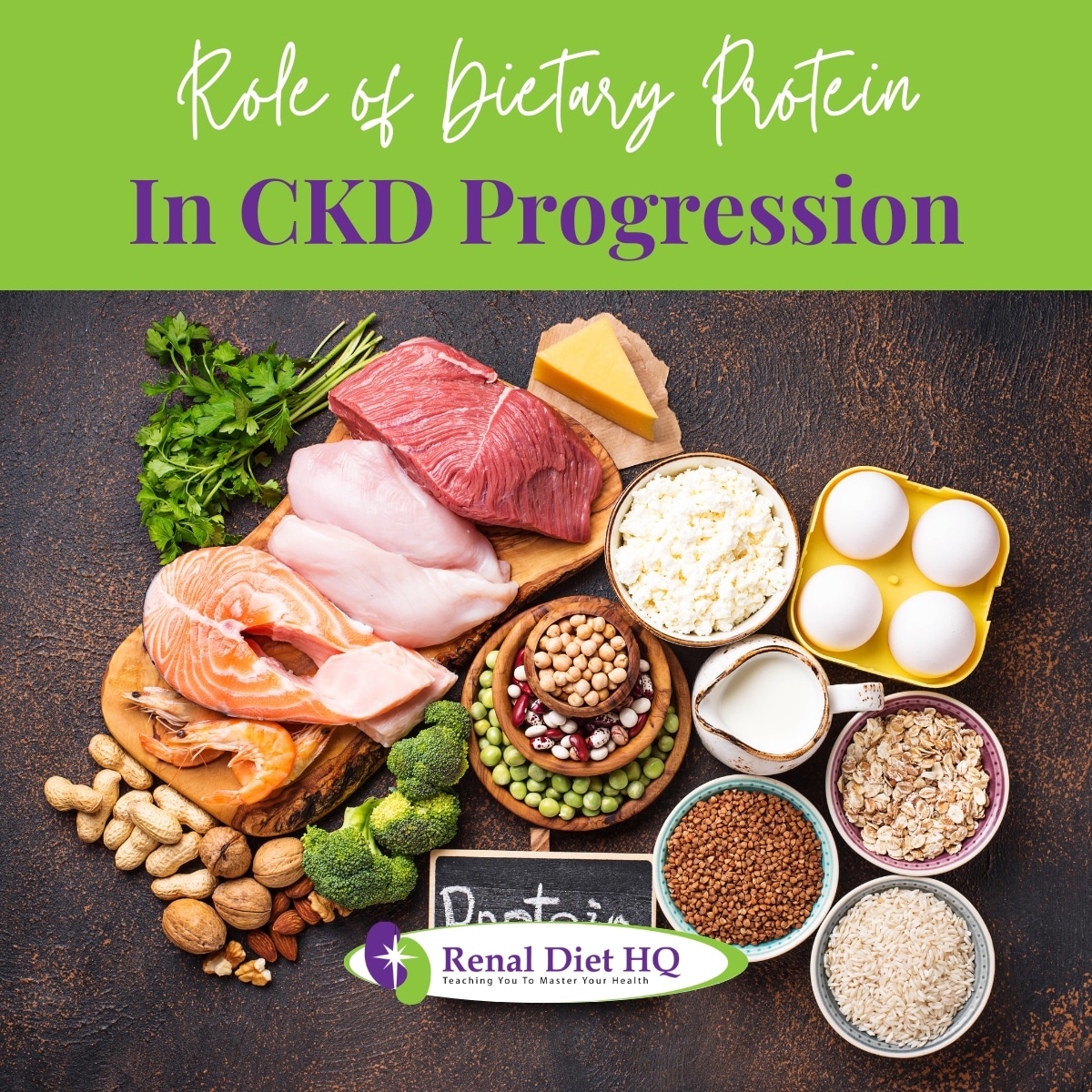
Role of Dietary Protein in CKD Progression
Your protein intake can make a big difference in the progression of your CKD. A diet with moderate amounts of protein is recommended, as too much protein increases the workload on your kidneys. However, it's important to get enough quality protein for weight management and to support muscle mass.
Animal sources such as poultry, fish, and lean red meat are considered the best sources of animal proteins as they are low in saturated fats. As part of a balanced diet, you should also include plant-based proteins like beans and legumes.
Eating healthy fats from unsaturated sources like nuts and vegetable oils may help manage CKD better than saturated fats found in fatty cuts of meat, fried foods, or processed snacks. With careful consideration of dietary choices, you can significantly reduce the risk factors associated with CKD and slow its progression.
Managing Sodium, Potassium, and Phosphorus in a Renal Diet
| Foods to Avoid | Possible Substitutes |
| Sodium-rich foods like processed foods (canned soups, frozen meals, etc.), fast food, salty snacks (potato chips, pretzels, etc.) | Fresh fruits and vegetables, unsalted nuts and seeds, whole grains |
| High-potassium fruits like bananas, oranges, tomatoes, sweet potatoes | Apples, berries, peaches, green beans, cabbage |
| Foods with high phosphorus, such as dairy products (milk, cheese, yogurt), dark colas, processed meats (bacon, sausage, deli meat) | Milk substitutes like rice milk and almond milk, lean meats (chicken, fish) |
Fluid monitoring and tracking your daily intake of sodium using a food journal are essential for managing CKD. Consider low salt substitutes and phosphorus binders as part of a healthy renal diet.
Additionally, there are many low-potassium products available that can help you maintain adequate levels for good health. By being vigilant about dietary restrictions and adhering to recommended guidelines, you can effectively manage your CKD symptoms and reduce the progression of the disease.
Fluid Restrictions in CKD: Why and How Much?"
Excess fluid in the body can lead to serious health complications if you have CKD, as diseased kidneys may struggle to get rid of extra fluids. So it's important to understand the importance of fluid restriction and how much is right for you.
Depending on your stage of CKD, your doctor may recommend that you limit your daily intake of fluids. Signs and symptoms of fluid retention are a good indication that you should reduce your intake or consult with a healthcare professional for advice.
However, during the early stages of kidney disease, your renal dietitian may also suggest drinking more water between meals to help flush out toxins from the body. It's important to follow their instructions carefully to ensure optimal kidney function and general health wellbeing.
Meal planning and making healthy food choices can also help manage fluid levels in the body. Limiting salt-heavy foods such as processed meats, pickles, olives, and canned foods like canned soups will help maintain safe sodium levels while limiting sugary drinks can limit both fluid intake and excess caloric intake from added sugars.
Knowing how much fluid is right for you is key to living well with CKD - talk to your dietitian about strategies that work best for you!
Dietary Adjustments for Co-existing Conditions in CKD Patients
If you have CKD, managing co-existing conditions is an important part of living well. Depending on your individual health profile, this may involve dietary adjustments to better manage other issues such as high blood pressure, fluid balance, as well as medication interactions.
Some medications used in kidney disease management may require special dietary considerations to ensure proper absorption or effectiveness.
It's essential to work with your healthcare team to identify and tailor the right diet for you. Eating a balanced diet with plenty of fruits and vegetables (kidney friendly fruits) can help provide necessary nutrients while keeping portion sizes in check.
Those who are awaiting a kidney transplant or dialysis will also need to watch their protein intake carefully as too much could lead to accumulation of waste products and difficulties for the kidneys.
In order to ensure optimal health outcomes and keep symptoms in check, it's important that CKD patients review their dietary habits with their dietitian regularly and make any necessary adjustments. By doing so, they'll be able to maintain a healthier lifestyle and improve their quality of life.
FAQs Renal Diet Restrictions By Stage Of CKD
Yes! There are several lifestyle changes that can help you manage your chronic kidney disease (CKD). Managing stress is important, as it can have a major impact on your health.
Developing an exercise routine tailored to your needs and abilities can have many benefits for people with kidney disease. Additionally, closely monitoring and regulating your fluid intake will help keep you healthy.
Reviewing medications with your healthcare provider is essential in keeping track of any potential complications. Finally, modifying your diet to fit the recommendations of your healthcare team is key in managing CKD.
Making these small changes can have a big impact on living with CKD!
You can monitor your renal health to prevent chronic kidney disease (CKD) from progressing by having regular monitoring tests done. It's also important to maintain a healthy fluid balance and keep an eye on your intake of potassium .
To further protect your kidneys, you should limit the amount of salt and protein in your diet. By following the recommendations of your dietitian, you can take steps towards protecting your kidney health and preventing further progression of CKD.
You may need to take dietary supplements to help treat some of the complications caused by chronic kidney disease (CKD), but it's also important to check with your healthcare provider to ensure that they are appropriate for your individual condition. Some of the supplements that your provider may recommend for you include vitamin B complex, vitamin C, vitamin D, and iron.
Remember that eating a balanced diet with plenty of fruits and vegetables will provide your body with vitamins and other essential nutrients that are beneficial for kidney health.
It's also important to avoid processed foods high in sodium and sugar. Additionally, limiting alcohol consumption and drinking plenty of water can help keep your kidneys functioning properly. Lastly, taking time each day to relax can help reduce stress on your body and potentially slow down the progression of CKD.
The long-term effects of chronic kidney disease (CKD) can be serious and range from physical to emotional.
If left untreated, it can cause anemia, heart disease, nerve damage, kidney failure, and even death. Taking preventative measures like controlling your blood pressure or following doctor's orders may help reduce the impact of CKD.
It is also important to manage any emotional stress that may arise due to living with CKD. With proper medical care and mindful lifestyle habits, you can help improve your overall health regardless of what stage you're in.
Keep in mind that each case of CKD is different, as genetic factors, environmental exposures, and lifestyle choices such as your dietary habits can all play a role in how CKD progresses.
Chronic kidney disease (CKD) is a progressive condition that can be caused by a variety of factors, including high blood pressure, diabetes mellitus, and certain medical conditions. Treatment for CKD typically focuses on managing the underlying cause and controlling symptoms.
This may involve medications to control blood pressure and blood sugar and lifestyle changes such as diet and exercise.
While reversing kidney damage is not possible, early detection and treatment of kidney disease can slow or even stop its progression. For example, managing high blood pressure and diabetes can help prevent further damage to the kidneys caused by these conditions.
Making lifestyle changes such as following a kidney-friendly diet tailored to your condition and getting regular exercise can help improve kidney function and overall health.
Renal Diet Restrictions Can Help You Manage Chronic Kidney Disease
You can manage chronic kidney disease (CKD) through dietary changes. To do this, you must follow specific dietary guidelines that depend on the stage of CKD you're in.
These often include dietary protein restriction and reducing your intake of minerals like sodium, potassium, and phosphorus. You may also need to adjust your fluid intake, depending on your stage of CKD.
Lastly, it's important to consider any co-existing conditions when making dietary adjustments for CKD. With these tips in mind, you can successfully manage your renal diet and help slow the progression of your condition.



